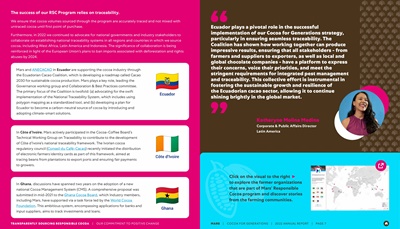
Click on the visual to the right
to explore the farmer organizations
that are part of Mars' Responsible
Cocoa program and discover stories
from the farming communities.
Katheryne Molina Medina
Corporate & Public Affairs Director
Latin America
Ecuador plays a pivotal role in the successful
implementation of our Cocoa for Generations strategy,
particularly in ensuring seamless traceability. The
Coalition has shown how working together can produce
impressive results, ensuring that all stakeholders - from
farmers and suppliers to exporters, as well as local and
global chocolate companies - have a platform to express
their concerns, voice their priorities, and meet the
stringent requirements for integrated pest management
and traceability. This collective effort is instrumental in
fostering the sustainable growth and resilience of
the Ecuadorian cacao sector, allowing it to continue
shining brightly in the global market.
In Ghana, discussions have spanned two years on the adoption of a new
national Cocoa Management System (CMS). A comprehensive proposal was
submitted in mid-2021 to the Ghana Cocoa Board, which Industry members,
including Mars, have supported via a task force led by the World Cocoa
Foundation. This ambitious system, encompassing applications for banks and
input suppliers, aims to track investments and loans.
In Côte d'Ivoire, Mars actively participated in the Cocoa-Coffee Board's
Technical Working Group on Traceability to contribute to the development
of Côte d'Ivoire's national traceability framework. The Ivorian cocoa
regulatory council (Conseil du Café-Cacao) recently initiated the distribution
of electronic farmers identity cards as part of this framework, aimed at
tracing beans from plantations to export ports and ensuring fair payments
to growers.
Mars and ANECACAO in Ecuador are supporting the cocoa industry through
the Ecuadorian Cacao Coalition, which is developing a roadmap called Cacao
2030 for sustainable cocoa production. Mars plays a key role, leading the
Governance working group and Collaboration & Best Practices committee.
The primary focus of the Coalition is twofold: (a) advocating for the swift
implementation of the National Traceability System, which includes using
polygon mapping as a standardized tool, and (b) developing a plan for
Ecuador to become a carbon-neutral source of cocoa by introducing and
adopting climate-smart solutions.
The success of our RSC Program relies on traceability.
We ensure that cocoa volumes sourced through the program are accurately traced and not mixed with
untraced cocoa until first point of purchase.
Furthermore, in 2022 we continued to advocate for national governments and industry stakeholders to
collaborate on establishing national traceability systems in all regions and countries in which we source
cocoa, including West Africa, Latin America and Indonesia. The significance of collaboration is being
reinforced in light of the European Union's plans to ban imports associated with deforestation and rights
abuses by 2024.
TRANSPARENTLY SOURCING RESPONSIBLE COCOA | OUR COMMITMENT TO POSITIVE CHANGE MARS | COCOA FOR GENERATIONS | 2022 ANNUAL REPORT | PAGE 7